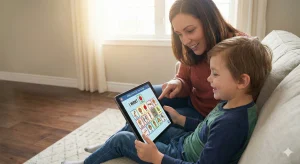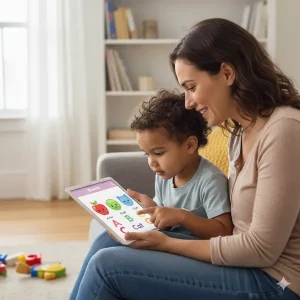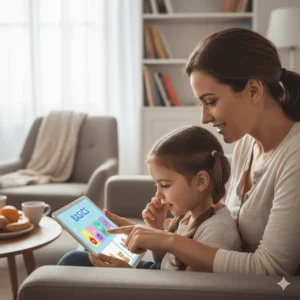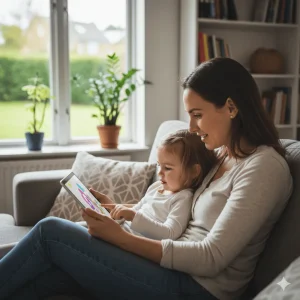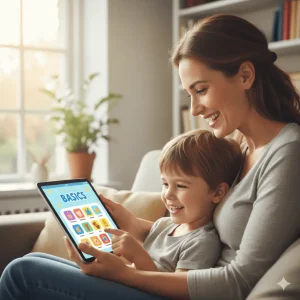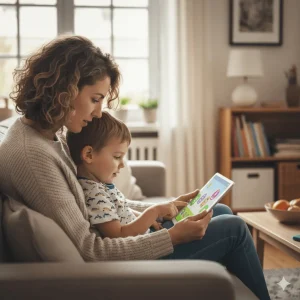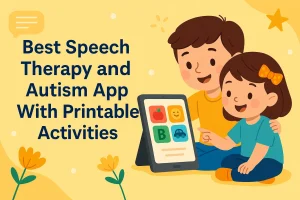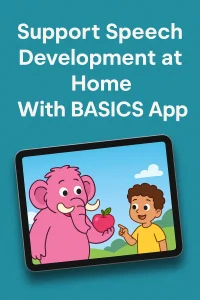How BASICS App Builds Early Learning Foundations Through Play
By Wellness Hub
Last Updated: October 24, 2025
Ever wondered why your child learns best when they’re playing—not when they’re being “taught”?
That’s because play isn’t just fun; it’s the brain’s favorite way to learn. Between ages 2 and 6, every tap, laugh, and curious question builds the mental wiring for focus, memory, language, and problem-solving.
The BASICS App takes this natural learning style and turns it into a structured, therapist-designed experience. Each activity—whether it’s matching, sorting, or listening—has a purpose behind the play. Through gentle repetition, colorful visuals, and engaging sounds, children begin to recognize patterns, link words to objects, and build confidence in understanding the world around them.
In this article, we’ll explore how BASICS App transforms everyday play into meaningful learning, helping your child develop attention, curiosity, and early academic readiness—all while having fun.
The Importance of Early Learning Foundations
The years between ages 2 and 6 form the bedrock of a child’s cognitive and language development. During this stage, the brain is rapidly wiring connections that shape how a child thinks, speaks, and learns. Research in early childhood education consistently shows that skills such as attention, memory, vocabulary, and reasoning begin to grow long before formal schooling starts. When parents nurture these abilities early, children enter preschool with stronger focus, clearer communication, and greater curiosity—key traits that define lifelong learners.
Why Ages 2–6 Are Critical for Growth
At this age, children move from imitation to imagination. They begin recognizing patterns, colors, and shapes, matching objects by category, and understanding simple instructions. Language expands quickly—from first words to small sentences—and every experience becomes a chance to label, compare, and describe. Strengthening these early learning foundations helps the brain organize information efficiently, making later skills like reading, counting, and problem-solving much easier to acquire.
The Role of Play in Developing Focus, Memory, and Social Skills
Play isn’t just recreation—it’s a child’s natural way of learning. Through playful exploration, children test ideas, repeat actions, and practice self-control. Activities such as matching games, memory challenges, and pretend play build working memory and attention span, while cooperative play with parents or peers promotes turn-taking, patience, and empathy. When learning feels like play, motivation stays high and anxiety stays low, creating the ideal setting for meaningful growth.
How Modern Learning Tools Make Foundational Concepts Engaging
Today’s digital tools—when thoughtfully designed—can transform passive screen time into active learning. The BASICS App, for instance, uses interactive visuals, sound cues, and guided challenges to bring early concepts to life. Children tap, listen, and respond in real time, turning abstract ideas such as size, color, or matching into playful, hands-on experiences. Every activity is developmentally sequenced, ensuring that each new task gently extends attention, memory, and understanding.
By blending play-based learning with therapist-designed structure, BASICS helps parents cultivate these essential early learning foundations right at home—building not only school readiness but also a lifelong love of learning.
The Science of Play-Based Learning
Play is not just fun—it’s how the brain learns best during early childhood. Research in early childhood development shows that play is one of the most powerful ways to build a child’s attention, language, memory, and problem-solving skills. The BASICS App is built entirely on this principle: that children learn faster when they’re actively engaged through sensory, visual, and auditory experiences rather than passive instruction.
How Sensory, Visual, and Auditory Play Stimulates the Brain
From tapping colorful shapes to identifying everyday sounds, every action inside BASICS is designed to activate multiple parts of the brain at once.
- Sensory play—such as dragging, tapping, or listening—helps children strengthen neural connections between what they see, hear, and feel. This integration improves processing speed, coordination, and focus.
- Visual learning through bright illustrations, object matching, and color recognition boosts visual discrimination—the ability to spot similarities and differences—an early predictor of reading and math readiness.
- Auditory play, such as identifying animal sounds or following spoken prompts, sharpens listening comprehension and sound–word association, preparing children for language and speech development.
When these sensory inputs combine, the brain creates stronger and longer-lasting memory pathways. That’s why children often remember a concept better when it’s taught through interactive play, not rote repetition.
Evidence From Early Childhood Development Research
Multiple studies in developmental psychology support the idea that play is the foundation of learning.
- Research from the Harvard Center on the Developing Child highlights that playful engagement builds executive function—skills like working memory, flexible thinking, and self-control.
- The American Academy of Pediatrics notes that play enhances language acquisition by encouraging back-and-forth interaction, a key driver of speech and cognitive growth.
- Studies on multisensory learning show that children retain up to 30–40% more information when they use multiple senses simultaneously compared to visual-only learning.
These findings align directly with how BASICS was designed: every activity blends sight, sound, and touch, allowing children to explore, make mistakes, and learn through joyful repetition.
Why Therapist-Designed Play Builds Attention and Curiosity
Unlike many digital games that simply entertain, BASICS was created by speech-language and occupational therapists to promote structured, goal-oriented play. Each task gently challenges attention span and curiosity without overwhelming the child.
- Activities begin with simple interactions—like matching objects—and gradually progress to complex cognitive challenges such as pattern recognition or early math concepts.
- Visual cues and auditory feedback keep children engaged, rewarding correct responses and motivating them to try again when they make mistakes.
- Because each level is designed to align with developmental milestones, children naturally experience a sense of progress, which encourages intrinsic motivation and sustained focus.
Therapist-designed play is purposeful: it builds attention control, improves task persistence, and nurtures a lifelong love for learning. As parents observe their child exploring the BASICS app, they’re not just seeing screen time—they’re witnessing brain development in action.
Foundation Forest — BASICS Ap Core Early Learning Level
The Foundation Forest is where every child’s learning journey begins inside the BASICS App. It forms the core of Level 1, carefully designed to introduce children aged 2–4 years to essential early learning foundations through play. This level transforms simple screen interactions into meaningful cognitive experiences, helping toddlers strengthen focus, memory, attention, and early problem-solving skills—all while having fun.
Overview of Level 1: Foundation Forest
At this level, BASICS App creates a structured yet playful environment where children practice foundational concepts that support later communication, literacy, and numeracy. Every activity is rooted in play-based learning, encouraging active exploration rather than passive watching.
Children tap, match, listen, and recall—each task strengthening a different aspect of their cognitive and language development. Through repetition, visual cues, and gentle reinforcement, the Foundation Forest ensures children stay engaged and motivated to learn.
It’s not just about memorizing; it’s about understanding connections—between objects, sounds, words, and ideas.
Key Groups in Foundation Forest
Level 1 includes six key activity groups, each focusing on a different area of early development:
- Matching – Builds observation and visual discrimination by helping children recognize patterns and similarities between objects.
- Sounds – Strengthens auditory processing as children identify environmental sounds, animal noises, and familiar items by listening carefully.
- Memory – Improves working memory through “find the pair” and “remember the picture” games that reinforce focus and recall.
- Pre-Math – Introduces size, quantity, and shape concepts like big vs small, long vs short, and circle vs square, laying the foundation for logical reasoning.
- Body Parts – Enhances self-awareness and vocabulary as children match body parts, name them, and connect them with their functions.
- Yes/No Questions – Builds comprehension and decision-making by asking children to respond to simple questions such as “Is this a cat?” or “Is the ball red?”.
Each group contributes to a child’s holistic growth—combining language, cognitive, and sensory skills into a unified learning experience.
Examples of Early Skills Practiced
In the Foundation Forest, every tap and response strengthens multiple skill areas simultaneously.
Here’s how play builds real learning outcomes:
- Matching similar objects (Visual Discrimination): Children learn to notice small differences and similarities—an essential step in recognizing letters, numbers, and shapes later.
- Identifying sounds (Auditory Processing): When kids link sounds to visuals, they develop early phonological awareness, a core component of future reading and listening comprehension.
- Remembering pictures (Working Memory): Memory games help children retain and recall information, improving their ability to follow instructions and remember classroom routines.
- Recognizing shapes and colors (Concept Learning): By naming and selecting shapes or colors, children enhance vocabulary, categorization, and conceptual understanding, crucial for school readiness.
How Gradual Challenge Nurtures Confidence and Focus
The Foundation Forest is designed to grow with the child. The early sets start with simple, one-step tasks—like matching identical pictures—before gradually increasing in complexity. As children progress, the number of choices increases, visuals vary in detail, and auditory prompts become more challenging.
This scaffolded learning approach ensures that each child experiences success before moving forward. Success builds confidence, and confidence fuels curiosity. Over time, this leads to longer attention spans, stronger focus, and intrinsic motivation to learn more.
Parents often notice that children who regularly use the Foundation Forest level show improvement in patience, problem-solving, and listening skills—all indicators of early cognitive growth.
By blending therapist-designed structure with the joy of discovery, the Foundation Forest helps every child build a rock-solid base for language, literacy, and lifelong learning—all through play.
Parent’s Role — Turning Screen Time Into Learning Time
In today’s digital world, screen time can either distract or develop a child—depending on how it’s used. With the BASICS App, screen time becomes an opportunity for active, guided learning rather than passive watching. When parents participate intentionally, each short session transforms into a meaningful moment of growth.
How Parents Can Guide Short, Focused BASICS Sessions
Children aged 2–6 learn best through brief, structured, and engaging activities. The BASICS app is designed for this developmental window, where attention spans are short but curiosity is high.
Parents can make the most of every session by:
- Keeping sessions under 15 minutes: Young learners benefit from focused bursts of play. Start with one or two Foundation Forest activities—like matching objects or identifying colors—before moving to something new.
- Following your child’s pace: If a task feels too easy, move up a level. If it’s too hard, repeat it together and celebrate small wins. This responsive approach builds confidence and consistency.
- Using “Goal Mode” for structure: BASICS’ Goal Mode guides families through daily practice routines, ensuring balanced exposure to cognitive, language, and memory-building activities.
Guided digital learning helps children stay attentive and motivated, while allowing parents to observe progress in real time.
Encouraging Interaction and Conversation During Play
The real value of BASICS lies in the parent–child connection. As your child taps, listens, and responds, narrate what’s happening aloud—this transforms play into a language-rich experience.
Try these simple interaction tips:
- Name and describe actions: Say, “You matched the red ball!” or “That’s a tall giraffe!” to reinforce vocabulary.
- Ask simple questions: “What color is that car?” or “Where is the cat hiding?” These small prompts help your child practice comprehension and verbal expression.
- Celebrate effort, not just results: Use positive feedback—“You tried again!” or “You remembered that one!”—to encourage persistence and attention.
Each shared moment builds early communication, strengthens social-emotional connection, and enhances cognitive engagement—all while keeping learning joyful and stress-free.
Tips for Balancing App Learning With Offline Exploration
The BASICS App is a powerful home-learning companion, but balance is key. What children learn through digital play should connect back to their real world. You can reinforce in-app concepts with simple offline activities:
- Match real-life objects: After playing the “Matching” game, ask your child to find similar items at home—“Can you find something round like this ball?”
- Recreate pre-math tasks in daily life: Compare sizes of fruits while cooking or count toys while cleaning up.
- Practice body awareness offline: After playing “Body Parts” or “Yes/No” games, turn it into a movement challenge—“Touch your knees!” “Show me your nose!”
- Include unstructured playtime: Building blocks, outdoor walks, or art time allow kids to apply what they learned in BASICS naturally.
By linking digital learning to everyday experiences, parents create a balanced routine that nurtures focus, curiosity, and independence. The goal isn’t just to limit screen time—it’s to make every minute count.
Preparing Children for Preschool and Beyond
How BASICS Bridges Home Learning and School Readiness
The transition from home to preschool can feel like a big step for both parents and children. The BASICS App bridges this gap by creating a familiar, comforting space where early learning happens through play. Its therapist-designed, structured activities introduce the same foundational concepts children will later encounter in school—but in a calm, visual, and interactive way that feels like a game rather than a lesson.
Each activity in BASICS builds preschool readiness skills such as listening, following directions, naming objects, and completing short tasks. Because the app adapts to your child’s pace, it encourages progress without pressure. Parents can guide just 10–15 minutes of play each day to reinforce attention, comprehension, and early classroom behaviors like turn-taking and focus.
Through consistent, guided play, BASICS helps children develop routines, curiosity, and the confidence to explore new environments—essential traits for a smooth preschool transition.
Early Exposure to Shapes, Colors, Numbers, and Routines
Before formal schooling begins, children benefit from recognizing shapes, colors, and numbers, which form the foundation for math and literacy. BASICS introduces these ideas naturally through interactive games in its Foundation Forest and Pre-Math sections, where kids tap to match shapes, identify colors, and count simple objects.
This early exposure builds vocabulary and reasoning: children learn to describe what they see (“The ball is red,” “The box is square”) while strengthening their visual discrimination and cognitive processing. Activities like sorting, arranging by size, and matching to audio prompts make abstract ideas concrete.
Daily routines—such as identifying morning and bedtime actions or understanding “what comes next”—help children grasp sequence, order, and time concepts, vital for preschool success. By practicing these patterns through play, children begin thinking in organized ways that mirror classroom learning.
Confidence and Independence Through Structured Play
One of the most valuable outcomes of BASICS is how it nurtures independence and confidence. The app’s goal-based learning design encourages children to complete small challenges and celebrate every win, helping them build intrinsic motivation.
As children recognize their progress—matching correctly, remembering objects, or identifying colors—they experience genuine success. This sense of achievement strengthens self-esteem, making them more willing to try new activities and take direction from teachers later on.
Structured play also teaches self-regulation: waiting for prompts, focusing on one task at a time, and following simple instructions. These habits form the behavioral foundation that supports group participation and early academics.
By combining fun with focus, BASICS transforms screen time into purposeful school preparation, guiding children to enter preschool not just with knowledge—but with curiosity, confidence, and readiness to learn.
How BASICS App Differs From Generic Learning Apps
Parents often ask what makes the BASICS App unique compared to other early-learning or speech apps available today. The difference lies in its therapist-designed structure, multi-sensory engagement, and goal-based learning path that mirrors how real child development progresses. While many apps rely on random quizzes or flashy animations, BASICS builds early learning foundations through structured play, focusing on attention, memory, and language growth.
Below is a detailed comparison that shows how BASICS stands apart:
| Feature | BASICS App (Therapist-Designed Learning) | Generic Learning Apps |
|---|---|---|
| Curriculum Design | Created by speech and occupational therapists, ensuring each activity supports developmental milestones from ages 2–6. | Often designed by general educators or developers without a developmental framework. |
| Progressive Cognitive Difficulty | Levels like Foundation Forest, Word Wonders, and Phrase Park follow a step-by-step progression — from matching and memory to sentences and math. | Activities are random or repetitive, offering limited skill advancement. |
| Multi-Sensory Interaction | Combines touch, sound, and visuals to activate multiple brain areas and improve focus, attention, and recall. | Primarily visual or auditory, lacking the sensory balance needed for deep learning. |
| Goal-Based Learning Path | Every goal (e.g., Early Learning Skills, Core Language Skills, Thinking & Attention) has clear objectives aligned with real-world developmental outcomes. | No defined learning goals or structured path; progress is not tracked systematically. |
| In-App Progress Tracking | Built-in reports show what your child has mastered, helping parents and therapists identify strengths and next steps. | Minimal or no progress data; parents can’t track what their child actually learned. |
| Therapy Integration | Complements speech, occupational, and behavioral therapy programs with home-practice modules. | Not designed for integration with therapy goals or specialist guidance. |
| Engagement Approach | Uses play-based tasks that reward focus, accuracy, and curiosity rather than just screen time. | Rewards are based on tapping speed or entertainment, not real skill growth. |
| Parental Involvement | Encourages guided interaction—parents can participate, ask questions, and reinforce learning. | Mostly passive screen interaction; limited opportunities for shared play. |
| Learning Domains Covered | Covers speech, language, cognition, pre-math, and emotional development in one platform. | Focuses on single domains like alphabet or colors, without integration across skills. |
Why This Approach Matters
- Structured Progression: BASICS introduces new challenges only after a child masters earlier skills, reducing frustration and encouraging confidence.
- Holistic Development: Each level supports both speech and cognitive growth, helping children understand, think, and express better.
- Evidence-Informed Design: Built on therapeutic strategies proven effective in early intervention and developmental therapy settings.
- Real-Time Feedback: Children get immediate audio-visual responses, reinforcing correct actions and helping them self-correct naturally.
By combining the science of early learning with the joy of play, BASICS App bridges the gap between therapy and home learning, ensuring that every tap, sound, and color contributes to measurable progress.
Key Takeaway — Play as the Foundation of Learning
Play is not just fun for children — it’s the foundation on which every early learning skill is built. Through playful exploration, kids develop focus, memory, attention, and curiosity — the very pillars of early learning foundations. The BASICS App harnesses this natural drive to play by turning educational goals into joyful, interactive activities that keep children motivated and engaged.
Each time your child matches pictures, identifies colors, or recalls patterns in Foundation Forest, they’re not just playing — they’re strengthening neural connections linked to thinking, language, and problem-solving. This kind of purposeful play transforms learning from a passive experience into an active process where every tap, sound, and visual cue reinforces cognitive growth.
Consistency matters most. When children use BASICS regularly — even for just 10–15 minutes a day — the effects compound over time. Repeated exposure to play-based tasks helps them retain vocabulary, improve focus, and build confidence in their abilities. Parents often notice measurable growth in comprehension, attention span, and expressive language within a few weeks of structured use.
But beyond progress charts and milestones, the greatest success comes from joy — when children look forward to learning. By making play a part of everyday routines, parents can turn ordinary moments into powerful learning opportunities. Whether it’s naming shapes at the breakfast table or recalling colors from a BASICS game, these small, consistent interactions lay the groundwork for lifelong curiosity and learning success.
In the end, BASICS App transforms play into purpose, helping children grow through laughter, discovery, and connection — one fun session at a time.
Frequently Asked Questions
1. What are “early learning foundations,” and why are they important?
Early learning foundations are the basic skills children develop between ages 2–6, such as attention, memory, language, and problem-solving. These skills form the groundwork for future learning, helping children understand instructions, communicate effectively, and think critically once they begin school.
2. How does the BASICS App use play to teach focus and attention?
BASICS integrates short, interactive games like matching, sorting, and memory challenges that naturally hold a child’s attention. Each activity is structured to build concentration step by step—encouraging focus through fun rather than formal instruction.
3. Can BASICS replace preschool or therapy sessions?
BASICS is designed as a supportive tool, not a replacement for preschool or therapy. It complements professional guidance by reinforcing early learning and communication skills at home through structured, therapist-designed play.
4. How much screen time is recommended for toddlers when using BASICS?
Experts suggest 20–30 minutes of guided, purposeful screen time per day for toddlers. Parents can divide this into shorter 5–10-minute sessions using BASICS activities that encourage hands-on interaction and parent participation.
5. Is play-based learning effective for children with developmental delays?
Yes. Play-based learning helps children with developmental delays by providing visual, auditory, and interactive experiences. BASICS uses repetition, gradual challenges, and therapist-backed design to help each child learn at their own pace.
6. Which early skills does BASICS strengthen through play?
BASICS builds essential early skills including attention, memory, vocabulary, listening, pre-math understanding, color and shape recognition, and problem-solving. These core areas promote overall readiness for reading, writing, and classroom learning.
7. What age group benefits most from BASICS early learning levels?
The early learning levels of BASICS—especially Foundation Forest—are ideal for children aged 2 to 5 years. These stages focus on building curiosity, observation, and basic reasoning skills essential before starting formal schooling.
8. How do BASICS activities differ from traditional learning apps?
Unlike typical apps that rely on repetition alone, BASICS offers therapist-structured, goal-based activities. Each level is sequenced to build on previous learning, blending speech, cognition, and play for well-rounded development.
9. Can parents track progress inside the BASICS App?
Yes. The app includes built-in progress tracking that helps parents see which skills their child has mastered and where support is still needed. It turns learning into a measurable, motivating experience for both child and parent.
10. How can parents make the most of BASICS at home?
Parents can enhance learning by sitting with their child during short BASICS sessions, naming objects aloud, praising effort, and connecting app concepts to real-world play. Consistency and positive engagement make digital learning more meaningful.
Book your Free Consultation Today
Parent/Caregiver Info:
Client’s Details:
* Error Message
